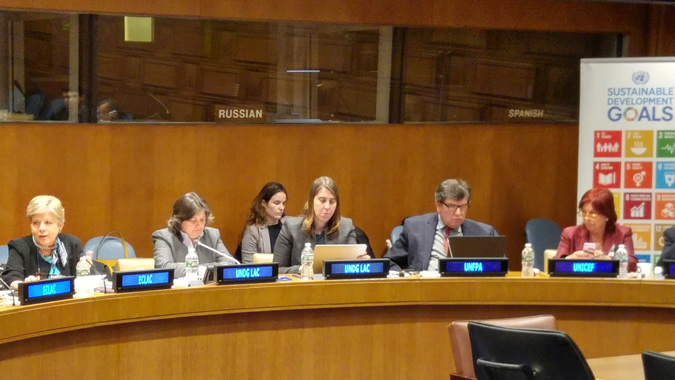ECLAC Highlights the Priorities for Implementing the 2030 Agenda and SDGs in the Region
Work area(s)
The organization’s Executive Secretary, Alicia Bárcena, participated in New York in a meeting of the United Nations Development Group for Latin America and the Caribbean.

The Executive Secretary of the Economic Commission for Latin America and the Caribbean (ECLAC), Alicia Bárcena, highlighted the organization’s priorities for supporting implementation of the 2030 Agenda and its Sustainable Development Goals (SDGs) during a high-level meeting held in New York.
On Wednesday, April 27, Bárcena gave a presentation during the joint meeting of the United Nations Development Group for Latin America and the Caribbean (UNDG-LAC) and the Regional Coordination Mechanism (RCM), which brings together the UN organizations involved in development matters.
The meeting was headed by ECLAC’s Executive Secretary, in her role as convener of the RCM for Latin America, and Jessica Faieta, Regional Director of the United Nations Development Programme (UNDP) and current Chair of UNDG-LAC. Other participants included Jan Eliasson, Deputy Secretary-General of the United Nations, who sent a message to the meeting, and Juan Somavía, Co-Chair of the Independent Team of Advisors of the United Nations Economic and Social Council (ECOSOC).
Alicia Bárcena spoke before directors and senior officials from the organizations that form part of the UNDG-LAC and RCM, among them the Food and Agriculture Organization of the United Nations (FAO), the Office for the Coordination of Humanitarian Affairs (OCHA), the Joint United Nations Programme on HIV/AIDS (UNAIDS), the UNDP, the United Nations Environment Programme (UNEP), the United Nations Organization for Education, Science and Culture (UNESCO), the United Nations Population Fund (UNFPA), the United Nations High Commissioner for Refugees (UNHCR), the United Nations Children’s Fund (UNICEF), the United Nations Office for Project Services (UNOPS), UN Women, and the Development Operations Coordination Office (UN DOCO).
Bárcena presented a general overview of the region's economic and social situation and the main present-day and structural challenges that it must tackle. She said that, in light of the 2030 Agenda and compliance with the SDGs, ECLAC will seek to support the integration of these goals into countries’ national development plans while also striving to strengthen statistical capacities for their measurement, bolster the means for the Agenda's implementation in the region, and strengthen the existing regional architecture.
With regard to the incorporation of SDGs into national development plans, Bárcena explained that officials must promote the creation of inter-institutional and cross-sector architectures at the most senior level to facilitate implementation and follow-up of the 2030 Agenda and the integration of its three pillars: economic, social and environmental.
On the matter of measuring the SDGs, she said national and regional statistical development strategies for gathering and disseminating quality data for the follow-up and monitoring of these goals must be fomented.
On the means for implementing the 2030 Agenda, ECLAC’s Executive Secretary insisted on the importance of supporting a regional analysis and the formulation of policies, as well as promoting coalitions between the State, the market and society. With respect to the regional architecture, Bárcena said that it is important to take advantage of the existing structure through collaboration with other regional actors (such as CELAC, CARICOM and UNASUR) and coordination with other regional United Nations entities through the RCM.
In addition, she said that the aim is to fuel the creation of a Sustainable Development Forum for Latin America and the Caribbean Countries that can serve as a platform to follow regional implementation of the 2030 Agenda and to debate regional priorities.
“We need global action for sustainable development, a new productive architecture and to consolidate the region's contribution. We must rethink our current development pattern in light of the 2030 Agenda,” Bárcena said.
Author
Country(ies)
- Latin America and the Caribbean
Contact
Public Information Unit
- prensa@cepal.org
- (56 2) 2210 2040